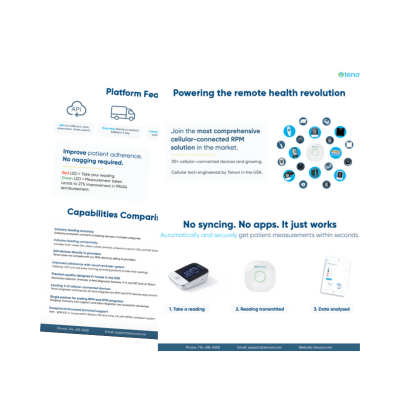This week’s research round-up from Tenovi explores the topic of patient satisfaction in remote physiological monitoring for chronic disease management and acute care. The second part of the article focuses on a groundbreaking study that explored the potential of remote physiological monitoring for people with dementia.
Patient Satisfaction in Remote Physiological Monitoring for Chronic Disease Management and Acute Care
In this study published in the Journal of Medical Internet Research, researchers set out to uncover patient experience and satisfaction levels with programs in remote physiological monitoring for chronic disease and acute care. Firstly, the study was conducted in a multi-site, multi-regional healthcare system. Secondly, between January 2021 and August 2022, 8,535 patients participated in the survey. Finally, over one-third of them, 3,331 patients, shared their thoughts and experiences.
Results
As a result, 89% of participants agreed or strongly agreed that the remote physiological monitoring program made them feel comfortable managing their health from home. Moreover, 94% of patients expressed satisfaction with the RPM program and were ready to graduate once they achieved their program goals. Now, that’s what we call success! 93% of participants enthusiastically recommended RPM to others facing similar health challenges.
In addition, two interesting insights came from the research. Age had no impact on the ease of technology use. Education also played a role in patients’ experiences, as individuals with a high school education or less found the equipment and educational materials helpful in understanding their care plans. This multi-site, multi-regional RPM program sheds new light on how clinicians can manage acute and chronic conditions away from hospitals and clinics.
Exploring the Potential of Remote Physiological Monitoring for People with Dementia
The following study summary explores the potential of remote physiological monitoring in patients with dementia. Researchers examined the distribution of physiological measurements from the “Minder” IoT remote monitoring platform. 82 individuals with dementia were monitored for over two years. The objective was to gain insights into the physiology of people with dementia within the context of their own homes and explore the potential of an alerts-based system for detecting health deterioration.
Participants used various devices such as blood pressure machines, pulse oximeters, body weight scales, and thermometers. They were instructed to use each device once a day at any time. The researchers analyzed the timings, distributions, and abnormalities in the measurements. This included the rate of significant abnormalities or “alerts” defined by standardized criteria. They also compared the alert study criteria with the National Early Warning Score 2 criteria.
Results
The 82 participants, with an average age of 80.4 years, recorded 147,203 measurements over 958,000 hours. Importantly, engagement with the monitoring system remained consistent throughout the study period. There was no decline in weekly measurements. Additionally, 45% of the participants met the criteria for hypertension. Individuals with α-synuclein–related dementia exhibited lower systolic blood pressure. Notably, a significant number of participants experienced clinically significant weight loss.
The study also included four case studies on the potential benefits and challenges of remote physiological monitoring in people with dementia. They highlighted instances where the system detected acute infections and symptomatic bradycardia in individuals taking donepezil. The results suggest that such monitoring systems are feasible and well-received by individuals with dementia and their caregivers.
Moreover, the findings show the potential of IoT-based monitoring in improving the management of acute and chronic comorbidities in patients with dementia. This study paves the way for exciting advancements in dementia care and highlights the transformative potential of IoT technology in monitoring and managing dementia.
Research Round-Up Summary
Overall, the articles emphasize the positive impact of remote physiological monitoring programs. The findings from these studies contribute to the growing body of evidence supporting the use of remote monitoring systems for improved patient care and outcomes. You can find more remote physiological monitoring research topics, recent studies, and research in the Tenovi blog.


